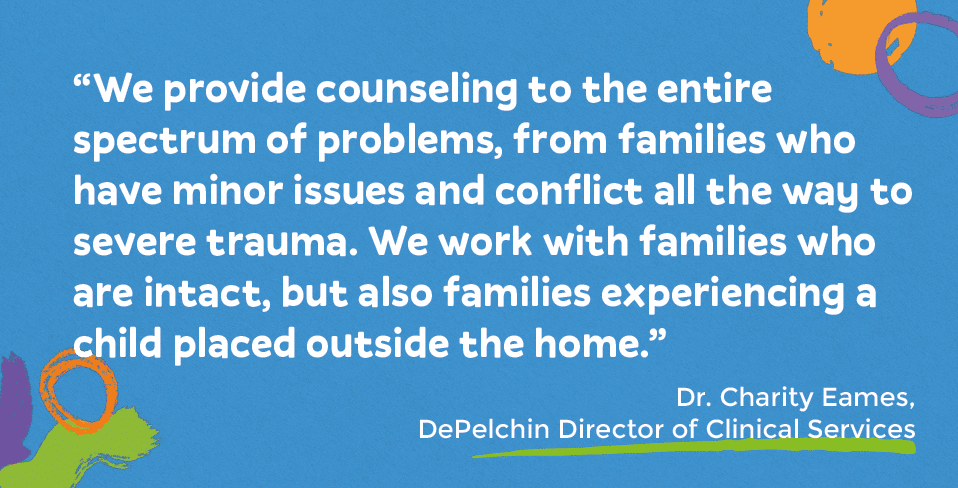DePelchin offers a variety of counseling programs to help families with a multitude of mental health issues, such as depression, anxiety, and issues stemming from trauma. Counseling is available in a variety of settings in the Houston area in order to best meet families’ needs. DePelchin uses evidence-based practices and strategies that fit the specific challenges families face.
Below, Dr. Charity Eames, DePelchin’s Director of Clinical Services, answers some common questions about the services, whom they serve, and how families can access them. She also explains how families can request services with a phone call or with a brief visit to the DePelchin website.
What are the different types of counseling programs that DePelchin offers?
We provide counseling for children and their families. We see children from birth all the way up to 17, as well as parents. We provide mental health counseling services to the parent because we recognize sometimes it’s their own issues — issues from childhood, or with their partner, or with their work — that affect their ability to parent, communicate with their children, be emotionally present, and have positive relationships with their children.
We provide services to families in Houston and surrounding areas. We do both office-based counseling and virtual or telehealth services. We have offices in several different locations and we also have community-based counseling programs in partnership with various entities. Some of our locations are clinics, and we do a great deal of school-based counseling. Our school-based program works in partnership with various school districts and Communities in Schools to place counselors in schools where children traditionally would not be able to access counseling services. We also have a trauma-focused counseling program that works specifically with children who have experienced trauma, are uninsured, and are in need of more intense services. We also provide counseling services to the foster youth of DePelchin statewide. DePelchin foster youth not only in Houston and surrounding areas, but also Austin, San Antonio and Lubbock, are able to receiving counseling as well.
We provide counseling to the entire spectrum of problems, from families who have minor issues and conflict all the way to severe trauma. We work with families who are intact, but also families experiencing a child placed outside the home. We also have a program in the San Antonio area where we work directly with CPS families, and in the Houston area we are doing a new project where we are working with families that have had active CPS involvement. Oftentimes, when a CPS case closes, despite the situation not being severe enough for CPS to remove the children or mandate services, CPS recognizes that families are still in need and could benefit from additional support. In this way, they are trying to prevent future CPS involvement.
How do counseling services serve as a strategy for preventing abuse and keeping families safe?
Mental health issues and conflict within a family are both issues that can lead to child abuse. With mental health issues, whether it’s the child or the parent, these are things for which families don’t have natural coping mechanisms. They don’t necessarily know how to deal with depression, anxiety, and traditional mental health issues. Family conflict is a lot of times related to communication and interactions between family members. If families knew how to fix it on their own, they would. People go to counseling because they don’t necessarily have the skills that they need. Counseling can provide those.
Do counseling programs serve a different purpose than the parenting classes that DePelchin offers?
The parenting classes focus more on behavioral-type circumstances. It’s things like parents spending more quality time with children, giving their children praise, and setting limits and being consistent with their parenting. The counseling piece of it deals more with the emotional side and issues like anxiety and depression. We are also able to deal with trauma. The counseling programs are really more the mental health side as opposed to the behavioral health side.
Who leads these counseling sessions?
The majority of the counselors we use at DePelchin are either licensed professional counselor interns, licensed marriage and family therapist interns, or licensed masters of social work who are working toward their licensed clinical social worker certification. They have completed their master’s degree, are provisionally licensed in the state of Texas, and they are under the supervision of fully licensed counselors. During the time of provisional licensure, they have to receive regular weekly clinical supervision. We are able to use counselors at this level because a lot of this is grant-funded; we are not billing insurance for these services and insurance is what requires the counselors to be fully licensed. That being said, some of our programs — such as the program that focuses specifically on trauma, or the program that works with children in foster care — do use fully licensed counselors. All mental health counselors at DePelchin are licensed in the State of Texas and all of our counselors receive additional training.
How much does it cost to access DePelchin’s counseling services?
Every counseling service that DePelchin provides is free. Everything is funded through a variety of grants and foundation funding.
Are there currently spots available for children and adults who need counseling?
Historically, most of our counseling programs have had a waitlist. This is because we are one of the only programs in Harris, Fort Bend, or Waller counties that can provide completely free counseling. However, over the last year, DePelchin realized that having potential clients sitting on a waitlist wasn’t helpful to families, so we reached out to several foundations and organizations within Houston to increase our capacity. Over the last year, we have hired 18 new counselors. So, we have a lot of capacity right now. We still tend to have a waitlist for our Spanish-speaking counselors because there is a lot of need and it is harder to find truly bilingual counselors, but even with that, we are looking for ways to decrease our waitlist. But right now, we are absolutely accepting referrals and when at all possible, we try to offer families appointment that week, the next week, or as soon as they can come in.
Do you have to be referred by a doctor?
Referrals can come a variety of ways. Families can refer themselves by going to the DePelchin website and requesting services. At the bottom of our website, it says “Refer a Family” and families can click on that and refer themselves. We also do receive referrals from providers. A lot of times, families may not have heard about DePelchin or may be reluctant to seek out help on their own, but they may ask for help through their school counselor, school social worker, a caseworker through a social service organization, or a pediatrician. Providers in the community may also refer families to DePelchin through the website’s “Refer a Family” feature. Families can also call DePelchin at (713) 730-2335 and say, “I would like counseling services.” We have some great intake staff who will talk to families and find out what the presenting problem is and what kind of issues they are facing.
How long do these services last?
Most of DePelchin’s programs are considered short-term counseling. We aren’t looking to provide services to families for years and years. We are trying to help families figure out solutions to get over the crisis they are experiencing, how to learn some coping skills to deal with what’s going on, and in addition to that, how can they take these things that they have learned and generalize them when problems arise in the future. We don’t want to make families feel dependent on counseling services and feel like every time something comes up in their lives, they have to come back to counseling. We do have families who will come back at different stages in their lives or when different problems arise, but most families only spend three to six months in counseling.



